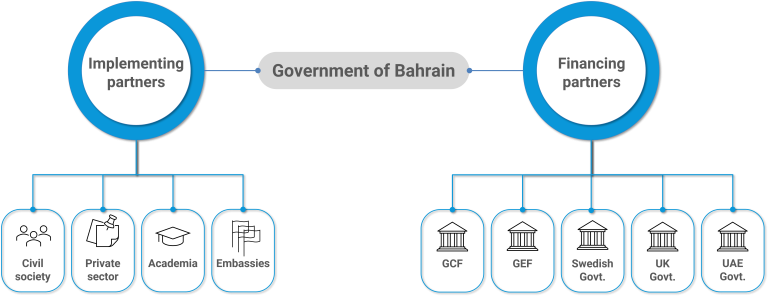Key Development Partners of the United Nations Development System in the Country
The United Nations in Bahrain relies on the the support of its many partners to implement its development activities in the country.

Support to Partnerships and Financing the 2030 Agenda
As cooperation across different stakeholders was crucial to the achievement of SDGs, the United Nations in Bahrain continued to strengthen its partnerships in 2021 through its numerous funds, programmes and specialized agencies. The United Nations also facilitated the strengthening of relationships across other development actors in the country and supported the Government of Bahrain in expanding its engagements in the region and beyond to advance the implementation of the 2030 Agenda.
All our activities in the country were implemented with the involvement of one or more of our partners, and many of our initiatives specifically focused on consolidating partnerships and contributing to the achievement of SDG 17. Out of the almost 40 sub-outputs under implementation by the UNCT in 2021, about one quarter had SDG 17 as a primary focus or as one of the several targeted SDGs.
During the year, United Nations entities signed new cooperation agreements and established new partnerships. For example, to increase access to key information for migrant workers and reduce their vulnerability to exploitation and abuse, a new partnership was developed with the Royal Netherlands Embassy in Kuwait. The partnership resulted in the provision of funding for a post-arrival orientation programme for migrant workers in Bahrain, set to be implemented in 2022. This partnership is reflective of the UNCT efforts to identify and tap into new sources of funding to accelerate the achievement of SDGs.
To promote youth engagement in sustainable development and consolidate youth programming, agreements were signed with several civil society organizations. Two of these organizations joined the Ministry of Youth and Sports Affairs and a few other youth-serving entities in a strong platform for cross-organizational partnership for youth empowerment as part of the implementation of a youth leadership programme supported by the United Nations.
Furthermore, the United Nations facilitated the engagement of diverse stakeholders in the development of national strategies and action plans, including in the formulation of the draft National Food Security Strategy 2020-2030, the draft Action Plan of the National Strategy for the Rights of Persons with Disabilities 2022-2026. In addition to ensuring the development of policy documents more responsive to existing needs, these efforts laid the foundation for effective cooperation in their implementation.
The United Nations support to partnerships for the goals and financing of the 2030 Agenda in Bahrain transcends the country’s borders.
For instance, the establishment of the Regional Centre of Excellence for Capacity Building in the Field of Combating Trafficking in Persons in 2021 with the United Nations support - a group photo from the first training programme for trainers who deal with victims of trafficking in persons organized by the Centre is provided above - will not only strengthen the capacity of those dealing with victims of trafficking in persons in Bahrain but will also facilitate the transfer of relevant knowledge and skills to those working with similar populations in other countries in the Middle East and North Africa region. The different global awards conferred by the Kingdom of Bahrain with the support of the United Nations and with the participation of regional and international partners also recognize the role of different organizations and individuals in development and strengthen alliances for SDGs.
The United Nations further supported the sharing of developing country expertise in Bahrain, particularly in the field of renewable energy generation. Specifically, the capacity building initiatives implemented by the Sustainable Energy Unit with the support of the United Nations involved a training partner from Sri Lanka, reflecting how developing country partners can play a mutually beneficial role in the development of Bahrain.

